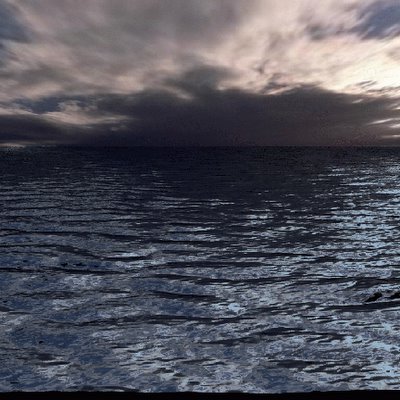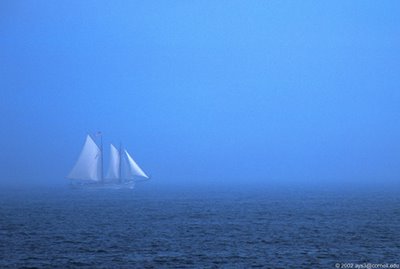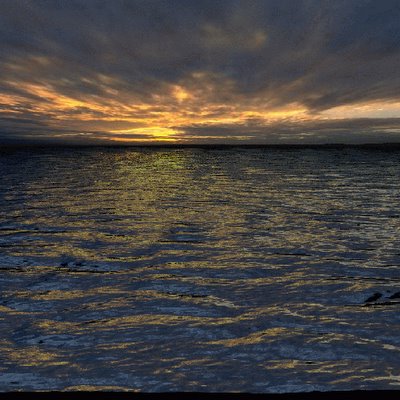
Magic, then, is natural when, after having considered well the powers of all natural and celestial things and having found their pattern by careful inquiry, the magician brings into the open the hidden and secret power of Nature. ... Remarkable wonders frequently arise this way, not so much by art as by Nature working these things, the art being no more than a servant. For magicians, as very careful inquirers into Nature, by applying and setting active things to passive, very often bring out the things that are prepared by Nature before the time that She appointed for these affects to be produced. These are commonly taken to be miracles but for all that they are no more than natural works.
-- Cornelius Agrippa (1486-1535),
Three Books on Occult Philosophy***
WHISTLE WHILE
YOU WORKFeb. 25, 2006
I can no more complete
a poem than fix my life
but I love ‘em anyway
as seas so wild and strange
above and down their surfaces
that I cant help but
sing as I cross ‘em
and call that music God’s.
I’m like the guy in the
old Kliban cartoon who
whistles tunelessly
in full joy while
pushing an endless
cart of coals in hell;
an observing devil
says to the other, “Ya
know, I don’t think we’re
getting through to that one.”
Indeed. Larynx today
the late cool dark of
February half winter’s
and full spring’s, volatile
and gusty with cold
then too-warm winds.
This Saturday’s one for
chores or time with my
wife over a ruinous
exhaustion, sick to
death of computers
and traffic and George
Fucking Bush: that
distempered ringing
is still my ears as
the first birds now tune
up their gentle strings.
My faith in sweetness
amid such gall must
scent from orchards in
the brain far removed from
clarity or common sense, a
thrall of curves and blooms
and crashing waves where
none are found at all.
I keep tallying some
permanent wild calculus
across and down the page,
summoning green
hours back in sums
of blue rage. My life
is found deepest
in paper arbors and
and harborage. Between
weariness and dying
sings a pure unbrassiered
silk-sliding-down ardor,
one scent one suck one
remembered smile more than
half in dark and yet enough
to make God great again,
my tapped-out spirit tanked
full for the next day’s walk
in orchard oceans I cannot
see but are the fullest
cresting of, astride this
fish of song. My oh my
what a wonderful day,
a bossa nova blue sashay
straight down the seaside
empyreia of a grateful heart.
How great thou art,
thou green and blue day.
***
Throw away the lights, the definitions,
And say of what you see in the dark,
That it is this or that it is that,
But do not use the rotted names.
How should you walk in that space and know
Nothing of the madness of space,
Nothing of its jocular procreations?
Throw the lights away. Nothing must stand
Between you and the shapes you take
When the crust of shape has been destroyed.
You as you are? You are yourself.
The blue guitar surprises you.
-- Wallace Stevens, “The Man With the Blue Guitar,” xxxii
***
The sea--this truth must be confessed--has no generosity. No display of manly qualities--courage, hardihood, endurance, faithfulness--has ever been known to touch its irresponsible consciousness of power. The ocean has the conscienceless temper of a savage autocrat spoiled by much adulation ... If not always in a hot mood to smash, he is always stealthily ready for a drowning. The most amazing wonder of the deep is its unfathomable cruelty ...
... Already I looked with other eyes upon the sea. I knew it capable of betraying the generous ardour of youth as implacably as, indifferent to evil and good, it would have betrayed the basest greed or the noblest heroism. My conception of its magnanimous greatness was gone. And I looked upon the true sea -- the sea that plays with men til their hearts are broken, and wears stout ships to death. Nothing can touch the brooding bitterness of its soul. Open to all and faithful to none, it exercises its fascination for the undoing of the best. To love it is not well. It knows no bond of plighted troth, no fidelity to misfortune, to long companionship, to long devotion. The promise it holds out perpetually is very great; but the only secret of its possession is strength, strength--the jealous, sleepless strength of a man guarding a coveted treasure within his gates.
-- Joseph Conrad, “The Initiation” (from
The Oxford Book of Sea Stories, ed. Tony Tanner)
***
PORTUGUESE MAN 'O WAR1995
Every ten yards along the shore
there's another one, a blue note
glowing like a coda on the sand.
It sharpens as I near into a pink
and cobalt sail billowed from within,
a pearl sown from the margins of abyss.
The feelers trailing back to sea
were never meant to rudder so harsh
or final a current as this shore.
Death combs the strings as the surf
desires, long as a noose or matting
their keel like pillaged skirts.
Many more amaze the beach ahead,
each a different spectra of the world's
worst blue, like fat flakes scattered
from an unseen, unsympathetic north.
Pay attention to these sterner
studies of a storm-roiled sea:
All night the bitter waves that
smashed their casual fury now recede,
leaving us these mongrel blooms,
beached and broken galleons
of a useless and eternal empire,
cool delight for the wandering eye
but stinging dickens for the feet,
beautiful to us only in death, and
forgotten three steps down the shore.

There was a delicious sensation of mingled security and awe with which I looked down from my giddy height on the monsters of the deep in their uncouth gambols. Shoals of porpoises tumbling about the bow of the ship; the grampus slowly heaving his huge form above the surface, or the ravening shark darting like a spectre through the blue waters. My imagination would conjure up all that I had heard or read of the watery world beneath me. Of the finny herds that roam its fathomless valleys; of the shapeless monsters that lurk among the very foundations of the earth and of those wild phantasms that swell the tales of fishermen and sailors.
-- Washington Irving, “The Voyage,” from
The Oxford Book of Sea Stories***
Pip loved life, and all life’s peaceable securities; so that the panic-striking business in which he had somehow unaccountably become entrapped, had most sadly blurred his brightness; though as ere long will be seen, what was thus temporarily subdued in him, in the end was destined to be illumined by strange wild fires, that fictitiously showed him off to \ten times the natural lustre with which in his native Tolland County in Connecticut, he had enlivened many a fiddler’s frolic on the green, and at melodious even-tide, with his gay ha-ha! had turned the round horizon into one star-belled tambourine. So, though in the clear air of day, suspended against a blue-veined neck, the pure-watered diamond drop will healthful glow; yet, when the cunning jeweller would show you the diamond in its most impressive lustre, he lays it against a gloomy ground, and then lights it up,not by the sun, but by some unnatural gases. Then come out those fiery effulgences, infernally superb; then the evil-blazing diamond, once the divinest symbol of the crystal skies, looks like some crown-jewel stolen from the King of Hell.
((then, after Pip is tossed from a whale-boat for the second time and left behind))
... Now, in calm weather, to swim the open ocean is as easy to the practiced swimmer as to ride in a spring-carriage ashore. But the awful lonesomeness is terrible. The intense concentration of the self in the middle of such a heartless immensity, my God! Who can tell it?
... By the merest chance the ship itself at last rescued him; but from that hour the little negro went about the ship like an idiot; such, at least, they said he was. The sea had jeeringly kept his finite body up, but drowned the infinite of his soul. Not drowned entirely, though. Rather carried him down alive to wondrous depths, where strange shapes of the warped primal world glided to and fro before his passive eyes, and the miserman, Wisdom, revealed his hoarded heaps; and among the joyous, heartless, ever-juvenile eternities, Pip saw the multitudinous, God-omnipresent, coral insects, that out of the firmament of waters heaved the colossal orbs. He saw God’s foot upon the treadle of the loom, and spoke it; and therefore his shipmates called him mad. So man’s insanity is heaven’s sense; and wandering from all mortal reason, is absurd and frantic, and weal or woe, feels them uncomprisied, indifferent as his God.
-- Melville,
Moby Dick (“The Castaway”
 ABYSSAL PLAINSONG
ABYSSAL PLAINSONG2002
There is a God (some say),
A deep, but dazzling darkness.—Henry Vaughan
While we sleep
the night hauls us
through deep billows,
cold and ever-black,
tiding us in surges
we can’t hold onto
or name, just dream.
Lost in the marges
of that boneless toil,
we ferry the dead
in St. Elmo’s Fire,
our pulse lucent
in their basalt veins.
Seals fan the
cold waters of our
oblivions, their
long-lashed eyes
weeping like beloveds
in lost windows
or children carried
off in dark hands.
We wander through
floorless rooms all night
as the centuries
glow from split
whalers and the
spires of lost towns.
No wonder when
the alarm clock
hauls us back
we’re like someone
rescued from a riptide
who must sit awhile
dazed on the shore:
To him our day
is strange, almost painful,
as infinity ebbs
in scowling thunder,
leaving this scrawled
manowar—our
only plunder.
TIN AHAB ... I see now that the force
that made him great
Drove me to the dregs of life. — Edgar Lee Masters, “Spoon River Anthology”
Be sure of this, O young ambition,
all mortal greatness is but disease.— Melville
It was the ungodly godly man
whose ship I so earnestly
yet badly sailed. I too yearned
to be a terror of the yeasty deep,
feral, uncompromising, brave,
unmatched but for the whale
which would drag me in the end to hell.
But who’s ever heard of a tragic
hero without a pair of pewter balls?
I merely drank in all the places
I should have been living
with impunity. The heart
of that grand amoral captain
of wild surges eluded me; I was
far too timid, too petty,
to vain; in the end I
was just too drunk.
My nights were just bad Melville,
a sot infatuated with grand
designs drifting in an inky
stinky whaleboat sans
oar or rudder, my will
two sheets to any breeze.
All the grand catches
got away, my barbs cartoonish,
slavish to false rigors.
No man’s more foolish
than he who hammers
a gold man from bad tin:
nor imparts less nobility
to the melancholy ship
he slowly sinks within.
A CUP OF OCEANNov. 2004
Our truest embrace
is this most tenuous relation,
a blue reverb I attenuate,
poem after poem,
of some prior, uroboric bliss--
mother’s womb, crashing
surf, a lover’s hips against mine
hauling bursting nets up from
the sea -- all now in these
salt-mine hallows of ocean
seem. Call it an immrama of
the heart’s inmost ache
to return to its birthing God,
isle after isle, till inmost
secret thrill is You.
Nothing yet has sufficed:
like drafts of selves I’ve
outrowed so many tropes
trying to find you somewhere
enough at last: Faith in God,
guitars, bars, beds, books,
breasts, now these verbal boats
which I loose, more numerous
than stars, upon a predawn
darkling tide -- nothing yet
has named, much less quelled,
that cathedralling ache
one true enough kiss would
surely slake. It has left me
more naked than ever in
a blue which cannot be
and is the ripe enthrallment
of blue seem, that old
river’s thunder and wave’s
collapsing boom forever down
the shore of what I call
my life. That music never ends;
it’s like the ocean the old monks
rowed their tiny coracles across
trusting God to steer them on.
A constant blue buoyancy, God’s
joyous homeward stream,
enough of heaven in every bite
of the daily oar, some dearth of it
on the next envisioned shore.
I know I’ll never get there,
though each day I rise to try.
Some day the craft will change,
perhaps the loving too; or the
work, the locale, the ache’s
exfoliate in some next orchard
heavy with strange and sweet
new fruit. My labors then may
row apolunar to these, purely
refuting the world I once
had named, entranced with waves
which shout inside their foam
that all I know of heaven and hell
and God and woman is surely
and securely not the way it is at all.
And thus I’ll be about revising
that immortal thrall, burying
the poet & carving crosses on
the ancient ogham stones,
reinventing all the arts in the
name of some new God.
No different than what I always do
when one taste of ocean bliss
proves too much of you.
THE CHILDREN OF WATER"O hide the bitter gifts of our lord Poseidon"
—Archolochus of Paros
… Long ago, when Manannan, the god of wind and sea, offspring of Lir, the Ocearius of the Gael, lay once by weedy shores, he heard a man and a woman talking. The woman was a woman of the sea, and some say that she was a seal: but that is no matter, for it was in the time when the divine race and the human race and the soulless race and the dumb races that are near to man were all one race. And Manannan heard the man say: "I will give you love and home and peace." The sea-woman listened to that, and said: "And I will bring you the homelessness of the sea, and the peace of the restless wave, and love like the wandering wind." At that the man chided her and said she could be no woman, though she had his love. She laughed, and slid into green water. Then Manannan took the shape of a youth, and appeared to the man. "You are a strange love for a seawoman," he said: "and why do you go putting your earth-heart to her sea-heart?" The man said he did not know, but that he had no pleasure in looking at women who were all the same. At that Manannan laughed a low laugh. "Go back," he said, and take one you'll meet singing on the heather. She's white and fair. But because of your lost love in the water, I'll give you a gift." And with that Manannan took a wave of the sea and threw it into the man's heart. He went back, and wedded, and, when his hour came, he died. But he, and the children he had, and all the unnumbered clan that came of them, knew by day and by night a love that was tameless and changeable as the wandering wind, and a longing that was unquiet as the restless wave, and the homelessness of the sea. And that is why they are called the Sliochd-na-mara, the clan of the waters, or the Treud-na-thonn, the tribe of the sea-wave.
And of that clan are some who have turned their longing after the wind and wave of the mind--the wind that would overtake the waves of thought and dream, and gather them and lift them into clouds of beauty drifting in the blue glens of the sky.
How are these ever to be satisfied, children of water?
 BLUE DEBT
BLUE DEBTFeb. 27, 2006
Lord, You have lent my
song the sea, perhaps that
I may sing the darkest depths
of it and voyage on its
silvered wake to every shore
a heart can walk and bed
til waves full crash to ebb.
Have I gained a measure
of the sea in these brine-
soaked waves which pulse
ever out and cross and down
in tidy drams of mad
immensity, harnessed as
I am to a nigh-infernal
surge? Have I said its
blue unsayables enough
to pay Your sea full back,
these volumes as thick
and nigh-inchoate
as a wet dream’s
incessant plunge through
ass-ending rooms? You
mortgage my desire’s
tidal knees to a soak’s
insatiable insoluble
degrees, a wake of curving
halcyons each with foam
and sea-wrack half in their eyes,
half obscuring why You
sent them all to greet me
to the surges of one storm.
My song is thus a lover’s
driving hips full diving to
the depths of You,
my joy flinging wild
and free into the sea’s
so-ravenous black maw.
Dry man I am and
yet full drowned I end
at this too-early so-
specious hour, siting on
a white writing chair like
lifeguard’s pale tower
front and center of
the night’s strange crashing
beach, or like a conductor’s
stand before a wild
symphony, or like the gallows
where the sea remits the man.
Lord, what a vicious
usury, to indemn
my water’s dreaming
to vaults of blue eternity,
a debt no words can ever
scale the half of, piled
high with depths I can
never fully say, much less
repay, not in this life
or my others, in this
life or the ones I sail
and dive and nap through.
Rapacious creditor,
here’s my next repayment,
as usual a few days late
and short a sou or two,
another grain to pave
that beach full back
where no man sings
the sea like it full sings
him and You crash
full and huge and loud,
augmented anyway,
pleased with the small
sound of my singing
though never sated
or poured or proud.
***
Impenetrable and heartless, the sea has given nothing of itself to the suitors for its precarious favours. Unlike the earth, it cannot be subjugated at any cost of patience and toil. For all its fascination that has lured so many to a violent death, its immensity has never been loved as the mountains, the plains, the desert itself, have been loved. Indeed, I suspect that, leaving aside the protestations and tributes of writers who, one is safe in saying, care for littel else in the world than the rhytm of their lines and the cadence of their phrases, the love of the sea, to which some men and nations confess so readily, is a complex sentinment wherein pride enters for much, necessity for not a little, and the love of ships -- the untiring servants of our hopes and our self-esteem--for the best and most genuine part.
-- Conrad, “The Initiation”
 SEA LABYRINTH
SEA LABYRINTH2004
Just beneath my trackless
ocean course between
this lonely shore and you
there lies a labyrinth,
an ancient code of your travail
which I enter as I launch
and wander as I sail,
finding the next isle
at its center not quite
sea or land but both
& you freshly departed,
the water in the well
there almost burning
with your blue, harrowed
to the dregs in the
lost carouse of you.
My job as I see it
from this chair today
is to make that
circuit canonical
and nude, an abbot
with his psalter
intoning lines over
waves that sing back
with nipples bigger
than a mouth: that
in those Nones of
stern devout your
gauzy peachy salt-
glazed beachy
pulses bossa rum sashay,
causing archangels
to go stout and
clamor for a fall,
just one, a good long
pussy plunging
dive down to the
saltiest names
of God. I see ‘em just
beyond the breakers
tumbling in a row,
those pairs of blessed
ankles and pale soles
vanishing in blue,
each like a book
tossed on the wave,
another vespering
poem. My job is
sound the depth
of that well
and count every bed
that’s lost down there,
each an inkling
burning with a desire,
an arrow’s shiver
up the mortal sense
that you’re staring
back up from that murk,
imploring all my seed
and ink and nouns.
My job’s to make
that view a shore
enfolded by incessant
tide, each wave an
antiphon and greeting
and taunt to mount
the coracle again
and chance once
more the main’s
desperately empty dazzle
with that spiral
dancing floor hidden
a mile of fathoms down
where gods and whales
and undressed lovers
sport and roam. Each
plunge and peramble
here comes to you
at last, or at least
that resonance
which hallows these
ears and haunts
my turn back home.
Each return is to
some higher deeper
ground where even
less is known and
the tide pounds harder,
like a kiss, a clench,
the next blue
widening door.
***
PRAYER FOR BALLASTFeb. 26, 2006
5:30 a.m.on Sunday, winds
outside heaving the garden
into the trees, heavy rains
at pause with more surely soon
to come. My despairing wife
online in the study perusing
linens on Ebay, searching
for patterns and ideas
for a dying business,
getting up at 3 a.m.
to avoid the dreams
of failure that have
been raiding her heart
every dawn of late.
After a halcyon afternoon
yesterday where I napped
and read sea stories, I
here turn back to
my purposes, the next
long week ahead.
Thank God for sturdy
ships & surly poems
running full to that
wind & singing “bring
it on” at the terrible
heaving heaven of salt
magnitude which no
song survives.
Bring it on. Bills to
pay if we have enough
in the checking account
& copy to draft for
the NTW website, then
it’s clean house & iron
clothes & cook dinner,
loving to hilt-depth
my wife & cats &
family & sponsees.
I pray God ballast me
with a happy heart and
a dreaming mind and balls
of pluck and fortitude,
for endurance of all
for the next week of work
and poems and ecstasies
of love inside the calyx
of a wet hungry world
both rousing and dead.
Bless this ship, oh Lord,
with every shore your
angels have raptured
and ripped and
and thundered then poured.














